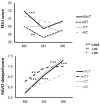Reducing Fall Risk with Combined Motor and Cognitive Training in Elderly Fallers
- PMID: 28208604
- PMCID: PMC5332962
- DOI: 10.3390/brainsci7020019
Reducing Fall Risk with Combined Motor and Cognitive Training in Elderly Fallers
Abstract
Background: Falling is a major clinical problem in elderly people, demanding effective solutions. At present, the only effective intervention is motor training of balance and strength. Executive function-based training (EFt) might be effective at preventing falls according to evidence showing a relationship between executive functions and gait abnormalities. The aim was to assess the effectiveness of a motor and a cognitive treatment developed within the EU co-funded project I-DONT-FALL.
Methods: In a sample of 481 elderly people at risk of falls recruited in this multicenter randomised controlled trial, the effectiveness of a motor treatment (pure motor or mixed with EFt) of 24 one-hour sessions delivered through an i-Walker with a non-motor treatment (pure EFt or control condition) was evaluated. Similarly, a 24 one-hour session cognitive treatment (pure EFt or mixed with motor training), delivered through a touch-screen computer was compared with a non-cognitive treatment (pure motor or control condition).
Results: Motor treatment, particularly when mixed with EFt, reduced significantly fear of falling (F(1,478) = 6.786, p = 0.009) although to a limited extent (ES -0.25) restricted to the period after intervention.
Conclusions: This study suggests the effectiveness of motor treatment empowered by EFt in reducing fear of falling.
Keywords: cognitive training; elderly; executive functions; fall risk; fear of falling; motor training.
Conflict of interest statement
The authors declare no conflict of interest.
Figures


References
-
- Fuller G.F. Falls in the elderly. Am. Fam. Phys. 2000;61:2159–2168. - PubMed
-
- Legters K. Fear of falling. Phys. Ther. 2002;82:264–272. - PubMed
-
- Jørstad E.C., Hauer K., Becker C., Lamb S.E., ProFaNE Group Measuring the psychological outcomes of falling: A systematic review. J. Am. Geriatr. Soc. 2005;53:501–510. - PubMed
LinkOut - more resources
Full Text Sources
Other Literature Sources

